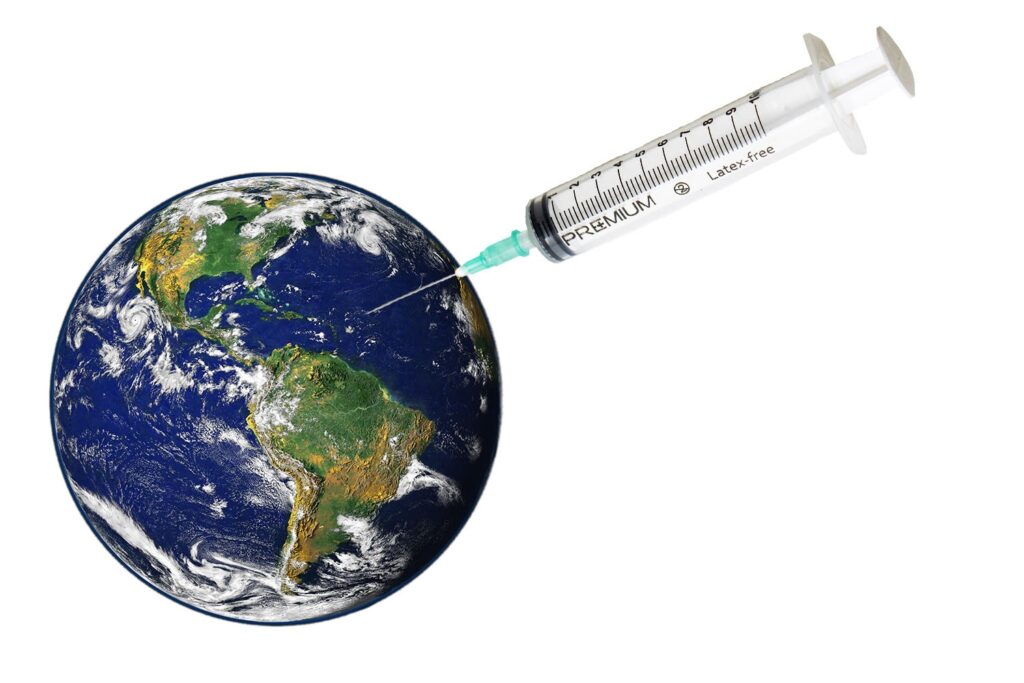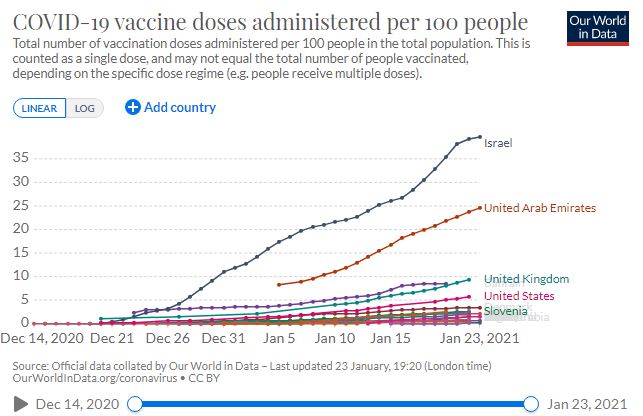
To recap where we are in the U.S., here are a few important numbers that encapsulate the speed and destructive power of COVID-19. This infectious virus has pestered mankind relentlessly for more than fourteen months, reproducing itself from host to host infecting more than 100 million lives globally.
On May 27, 2020, five months after the first reported U.S. case of the COVID-19 variant was found in Colorado, the U.S. death toll from COVID-19 surged past 100,000 people.
On September 22, 2020, four months later, the U.S. death toll from COVID-19 hit 200,000 people.
On December 14, 2020, three months later, the U.S. COVID-19 deaths topped 300,000 when vaccinations began to roll out.
On January 19, 2021, one month later, the U.S. COVID-19 deaths were reported to top 400,000 people. The 400,000-death toll is greater than the population of New Orleans, Cleveland or Tampa, Florida. President Biden even warned the worst of the pandemic is yet to come, comparing the COVID-19 deaths in the U.S. to the country’s troop fatalities in World War II.
This heavy toll boils down to human ignorance and arrogance of a zoonotic disease, a disease shared between animals and people. Precisely, COVID-19 is a novel zoonotic coronavirus related to SARS-CoV and a number of other bat-borne SARS-like coronaviruses. Natural selection is a powerful force. Each viral infection increases the risk of a mutation that could make the virus more infectious, deadlier, or cause vaccines or treatments less effective. To date, two new variants of the novel coronavirus have been discovered in Britain and South Africa. They have spread with ferocious speed locally and abroad. You may have come across their medical labels—variant B.1.1.7 for the British strain and variant 501Y.V2 for the South African strain. On January 22, the more highly transmissible SARS-CoV-2 variant, B.1.1.7, was detected in twelve U.S. states. A week later, the South African variant was first found in two cases in South Carolina. Some tests suggest the South African and Brazilian variants may be less susceptible to antibody-rich blood from COVID-19 survivors. GISAID, a global science nonprofit group, warns that new variants of SARS-CoV-2 have been reported in Brazil, France, Australia, Germany, Switzerland, Japan, Sweden, South Korea, Finland, Ireland, the Netherlands, and the UK.
The transmittable virus vs. the distribution of vaccines
If we divide the world into two categories: “the Haves” are for countries which are able to stockpile COVID-19 vaccine, and “the Have-nots” are for countries which are left behind due to a lack of financial means and leadership. A glimpse of the country names that are reported to have new variants of COVID-19, it is not difficult to group them into “the Haves” category. Will South Africa prove the world wrong about the impression of vaccine distribution inequality, given the country is the most unequal country in the world? What about those countries in “the Haves” category? Will they distribute COVID-19 vaccines promptly to those vulnerable and most needed?
I happened to speak to a couple of healthcare workers and seniors over aged 80 recently. Everyone has their own grievances. Either the official website or hotline of vaccine registration failed to respond to an overwhelming number of inquiries and requests, or the COVID-19 vaccine was out of stock and the restocking date was indefinite.
A medical assistant in her twenties told me that she had her first shot of vaccine and she was required to register again for the second shot. She called the state public health office 30 times and finally got through the hotline. However, the voice on the other end of the line told her that demand was higher than supply and they had no clue when the new shipment would arrive. The poor young soul was told to call back sometime in the near future. An elderly from upstate New York told me his vaccination scheduling was deferred to spring due to shortage of vaccine. To date, almost every American is impatiently waiting for their elected officials to offer some sort of aid and assistance, such as answering the phone calls from voters, responding to the website queries and resolving problems ranging from financial relief to COVID-19 vaccination.
Will new algorithms be ever needed the most to improve communication in public service?
Will robots take the job soon to record human complaints and facilitate problem solving?
Will an employee reward mechanism to be built for public servants to address taxpayers’ grievances based on employee’s time management?
The distribution of vaccines definitely is not fast enough to satisfy global demand. This January, the World Health Organization (WHO) raised a red flag about “catastrophic moral failure” because of unequal COVID-19 vaccine policies. Canada is reportedly to have ordered enough vaccine doses to protect each Canadian five times whereas nearly 70 lower-income countries would only be able to vaccinate one in 10 people. Which are the low-income countries? To name a few, Kenya, Myanmar, Nigeria, Pakistan and Ukraine have reported nearly 1.5 million cases among them. The rich nations only account for 14% of the global population but they have bought up 53% of the vaccine candidates announced so far. If this is not money talking, what is?

As shown in the chart, on January 23 Israel and United Arab Emirates led the world in delivering more doses per person. Before the one-dose vaccine is viable, the two-dose vaccines are tested more effective and will take a longer time for users to complete the entire inoculation within up to six weeks. Several countries are now talking of giving only one dose of any two-dose vaccine to individuals, and distribute the second dose to benefit a larger population. According to WHO, to safely achieve herd immunity against COVID-19, a substantial proportion of the world’s population would need to be vaccinated. And the threshold for herd immunity varies with each disease. For polio, the threshold is about 80%; and for measles, it requires about 95% of a population to be vaccinated. The threshold for COVID-19 is not known but it is estimate to be 60% of the population.
That said, even though the rich nations secure more vaccine for their own populations, as long as the poor nations are not vaccinated at an equally fast speed and by the similar capacity, or even larger due to their larger populations, the world cannot return to its pre-COVID-19 normalcy.
The sooner people are vaccinated, the less chance for viral mutation to happen. If not, the outcome will fall into a reinforcing feedback loop—the more people are infected, the more conducive to viral mutation through natural selection. As a result, the easier-to-spread new variants may lower the vaccine efficacy to ineffective. In that regard, the transmittable virus outpaces the distribution of vaccines.
In the U.S., vaccination is one of many polarized topics. The anti-vaccine movement gains momentum from misinformation and religious propaganda. If you have received spams recently about how harmful COVID-19 vaccine is, you are not the only one. I am also a spam receiver. A report by The Lancet noted that 31 million people follow anti-vaccine groups on Facebook, with 17 million people subscribing to similar accounts on YouTube. What’s the gambit behind this movement? The report shows the anti-vaccine movement could generate US$1 billion in annual revenues for social media firms. Social media firms should have been denounced for having what WHO called “catastrophic moral failure.”
The distribution of vaccines vs. the spreading of Valentinus
As the pandemic-laden world is welcoming Valentine’s Day which has been celebrated since the middle ages, I find the occasion cannot be more apt for remembrance and resilience. Many families lost their loved ones to COVID-19 last year. Why not make this year’s Valentine’s Day a memorial for the departed and dearly missed? Like virus, love is infectious. Unlike virus, love helps mankind conquer fear and get through hard times. I reacquainted myself about the origin of Valentine’s Day. The name “Valentine” originated from “Valentinus” in ancient Rome. “Valentinus” was a common name in the late Roman Empire, meaning “strength.” We need strength now like no other. We need the widest and fastest spreading of Valentinus to get through the months ahead as the COVID-19 vaccination is rolling out in every community.
Historical records point to several Christian martyrs named Valentinus. According to some accounts in ancient Rome, Emperor Claudius II executed two men both named Valentinus on February 14 of different years in the 3rd century A.D. Their martyrdom was honored by the Catholic Church with the celebration of St. Valentine’s Day.
When I think of anti-vaccine protesters, I can’t help thinking of the motto “In God We Trust” that is placed on U.S. coins and bills. Simply because many protesters claim themselves to be children of God, they must trust God just as the motto on the U.S. monies reminds us. Devout followers love God and God loves his children. Can the motto be interpreted as “In Love We Trust”? If it is so, the distribution of vaccines and the spreading of Valentinus should go hand in hand.
If only the world would be as lovely as the song “Lovely Day” sings, and if only the distribution of vaccine would win the race at the fastest speed, our days ahead might be more hopeful in the company of Valentinus, strength.

